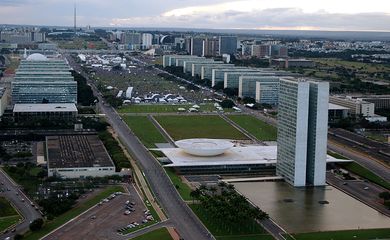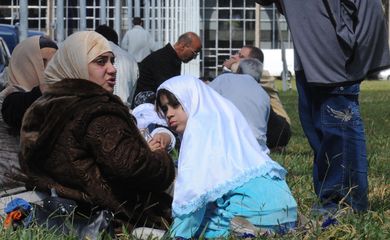Refugees teach languages and share experiences




The main groups of refugees in Brazil come from Syria (photo), Colombia, Angola, and the Democratic Republic of the Congo.
Refugees from various countries are teaching languages and introducing Brazilian students to their native cultures in Arabic, English, French and Spanish courses, which began this week through the Abraço Cultural (“Cultural Embrace”) project run by two Brazilian NGOs, Adus and Atados.
The courses provide a cultural exchange opportunity for students, with classes that go beyond the board-and-book standard lessons to include cookery, music, dance, arts and crafts from the countries, as well as archaeology and history lectures. “Right from the beginning, teachers share some of their culture with students and students share theirs,” said the English program coordinator, Blandiny Ferrari.
She said one of the course aims is to remove barriers between refugees and Brazilians by sharing experiences, creating income, and recognizing the value of teachers. “Many refugees are coming now, and some people have a misconception that they won't create value. Our purpose is to integrate them into our society, we want to support them above all.”

Alphonse Nyembo.jpg
Alphonse Nyembo, 29, from Congo, is one of the English teachers, and also speaks French. He arrived in Brazil in 2012, fleeing war in his country. He says many people mix up cultures from the different African countries and the course is an opportunity to show this diversity and share what he has learned there.
With the money he makes as a teacher, Nyembo is studying mechatronics. When he graduates later this year, he wants to juggle the new occupation with his English lessons for Brazilians.
Juliana Pepper, 28, is an architect. She says she began the course “driven by the cultural exchange. More than an English course, it provides a lot of experience and insight from the teachers with a different culture that looks nothing like my daily life.”
Her teacher, Nour Massoud, is from Syria, and has been in Jordan and England before she came to Brazil. She does not speak Portuguese, but she learned a couple of words at her first lesson Monday (July 6). She said Syria is not a safe place because of war. Her family are still there, but she is not planning to return to the country.
According to Brazil's National Committee for Refugees (CONARE), there were 7,289 recognized refugees in Brazil as of October 2014. They are of 81 nationalities, including resettled persons. The main groups come from Syria, Colombia, Angola, and the Democratic Republic of the Congo.
Translated by Mayra Borges
Fonte: Refugees teach languages and share experiences

Dê sua opinião sobre a qualidade do conteúdo que você acessou.
Escolha sua manifestação em apenas um clique.
Você será direcionado(a) para o sistema Fala.BR, mas é com a EBC que estará dialogando. O Fala.BR é uma plataforma de comunicação da sociedade com a administração pública, por meio das Ouvidorias.
Sua opinião ajuda a EBC a melhorar os serviços e conteúdos ofertados ao cidadão. Por isso, não se esqueça de incluir na sua mensagem o link do conteúdo alvo de sua manifestação.
Clique aqui para mais informações sobre a Ouvidoria da EBC.










